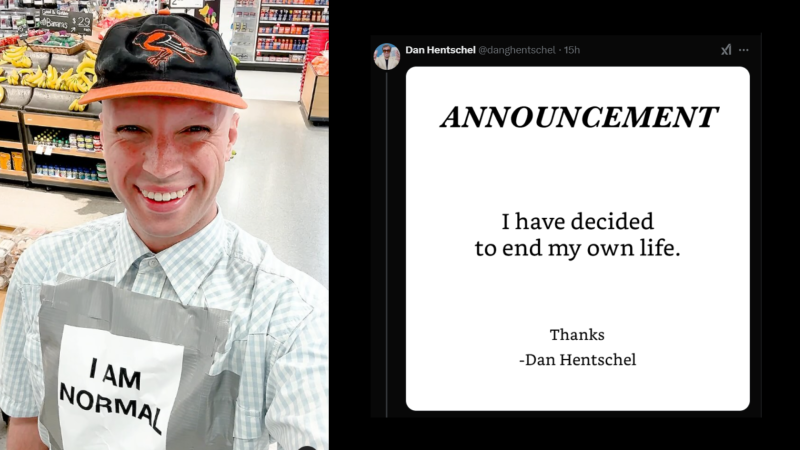
Social media personality Dan Hentschel has once again found himself at the center of online controversy after a recent post on his official X account (formerly known as Twitter) sent shockwaves through his community. The post featured a stark image with the word “Announcement” in bold capital letters, followed by the message:
“I have decided to end my own life. Thanks – Dan Hentschel.”
Within hours, the post had garnered over 170,000 likes, with users flooding the comments section with expressions of worry and concern over his well-being. The post’s dramatic nature has raised questions among fans, critics, and mental health advocates alike, as many wonder if the statement is a genuine cry for help or a calculated move designed to boost engagement.
A Closer Look at the Controversial Post
Hentschel’s recent declaration has sparked a heated debate on social media. Some users expressed immediate alarm and reached out with supportive messages, urging him to seek help. Others, however, quickly dismissed the claim, noting that Hentschel has a history of provocative and attention-grabbing posts. The stark contrast in responses highlights the blurred line between performance art and genuine distress in today’s digital age.
Comments such as “Why isn’t anyone taking this seriously?” and “Because he’s done this before,” reflect a growing skepticism among some followers. The polarized reactions have only amplified the controversy, prompting many to analyze past posts and statements made by Hentschel to determine the authenticity of his recent message.
The Man Behind the Online Persona
Dan Hentschel is not new to controversy. Known for his satirical approach to content creation, Hentschel often uses caricatures of himself and other original characters to deliver biting social commentary. His work, while creative and sometimes humorous, has been described by some as unsettling and disturbing. This blend of dark humor and shock value has earned him a reputation for pushing boundaries and challenging conventional norms on social media.
Hentschel’s style of mixing satire with controversial statements means that his posts are frequently met with mixed reactions. For some, his content is a form of artistic expression and commentary on societal issues; for others, it can be seen as irresponsible, especially when it involves topics as serious as mental health and suicide.
Previous Incidents and Ongoing Controversy
This isn’t the first time Dan Hentschel has attracted significant attention for his social media antics. A month ago, he became the subject of a police investigation following a video clip in which he recounted plans to commit a mass shooting at a Harford County school. The video, which featured him reminiscing about his alleged intentions at The John Carroll School in 2013, triggered a swift response from local authorities. The incident led to a police probe, and Hentschel later posted on Instagram, writing, “Hey y’all I need a lawyer!” along with a screenshot of the investigation notice from the Bel Air Police Department.
This previous controversy has only fueled speculation about his current post. Critics argue that the suicidal announcement might be another stunt designed to capture public attention and increase his online following. This recurring pattern of provocative behavior has left many wondering about the sincerity and impact of his statements on his audience.
Social Media and the Responsibility of Influencers
The case of Dan Hentschel brings to light the broader issue of responsibility among social media influencers. In an era where online content can quickly spiral out of control, the distinction between art, satire, and genuine distress becomes critically important. Influencers like Hentschel wield significant power over their audience, and their posts—whether intended as humor or serious commentary—can have real-world consequences.
Mental health professionals emphasize that discussions involving suicide and self-harm require a delicate and compassionate approach. When public figures make statements about ending their own lives, even if intended as satire, it can inadvertently trigger emotional distress among vulnerable followers. Therefore, it is crucial for influencers to consider the potential impact of their words and for social media platforms to have robust measures in place to address such content.
Public Reaction and the Debate Over Authenticity
The reaction to Hentschel’s post on X has been intense and multifaceted. While over 170,000 likes indicate a significant level of engagement, the comments section reveals a community divided between concern and skepticism. The ongoing debate centers on whether Hentschel’s message is a legitimate expression of despair or another publicity stunt aimed at increasing his visibility and influence.
Some followers continue to defend his unique brand of humor, arguing that his past actions and controversial posts should give viewers pause before taking his words at face value. Others worry that the normalization of such statements—whether genuine or not—might desensitize the public to the seriousness of mental health issues.
The Intersection of Satire, Provocation, and Mental Health
Dan Hentschel’s recent post is a stark reminder of the complex interplay between satire, social media influence, and mental health. In a digital landscape where content can be manipulated for shock value or artistic expression, the line between reality and performance is increasingly blurred. As influencers push the boundaries of acceptable content, it is essential for both creators and consumers to engage critically with the material presented.
Mental health advocates urge that discussions around suicide be handled with care. They recommend that any alarming messages, regardless of their intended tone, be taken seriously by those who may be at risk. For individuals in crisis, seeking help from trusted professionals or support networks is vital. In the United States, for instance, the National Suicide Prevention Lifeline is available 24/7 at 988, and similar resources are available globally.
Final Thoughts
As the controversy surrounding Dan Hentschel’s recent announcement continues to unfold, it serves as a reminder of the responsibilities that come with having a large online following. Whether the post was a genuine cry for help or another provocative stunt, the conversation it has ignited is an important one—highlighting the need for sensitivity, accountability, and a balanced approach to humor and mental health on social media.
For now, the question remains: Did Dan Hentschel truly intend to end his own life, or is this merely another controversial chapter in a career defined by provocative online behavior? Only time will tell, but the debate underscores a broader societal challenge of navigating the complex and often murky waters of digital expression in today’s interconnected world.



